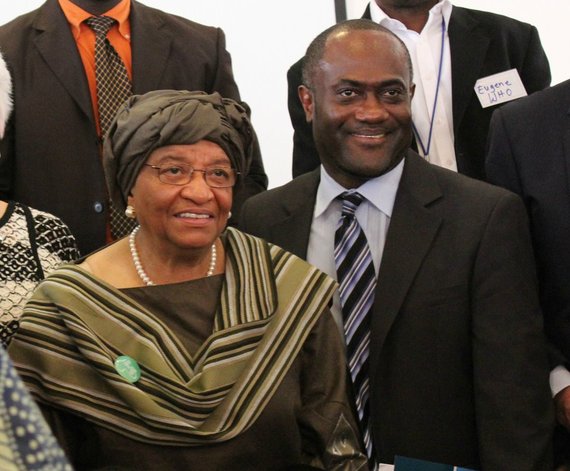Whether it's a pandemic, armed conflict or a natural disaster, civil society has unique strengths to help people cope with catastrophes.
 President of Liberia Ellen Johnson Sirleaf with IREX Chief of Party Bill Burke at the first national conference on Ebola
President of Liberia Ellen Johnson Sirleaf with IREX Chief of Party Bill Burke at the first national conference on Ebola
After a period of intense national suffering, Liberia has just been declared Ebola-free by the World Health Organization. In addition to thanking the dedicated health care workers in her country, President Sirleaf acknowledged the key role civil society played in helping to turn the tide.
Civil society, including registered nongovernmental organizations (NGOs), informal networks of citizens and faith-based institutions, has unique strengths in mitigating crises that can complement -- and sometimes compensate for -- formal government systems. A recent event hosted by IREX explored these very issues and the assets civil society can bring when disasters arise.
Established Networks: Reaching people can be a challenge in any crisis. Carl Gershman, President of the National Endowment for Democracy, spoke about how civil society has "the ability to reach citizens at the community level." One example he gave was of a national youth organization in Afghanistan that is known for its blood drives whenever there's an attack by the Taliban.
Flexibility: Crises are dynamic and local organizations have the ability to adjust in real time under changing circumstances. Bill Burke, IREX Chief of Party in Liberia, talked about how local partner NAYMOTE adapted their Vote Smart Van project, originally an election activity, to reach and support communities struggling with Ebola. Gershman also noted how local civic groups responded to the devastating floods in Bosnia Herzegovina and Serbia last year, organizing across ethnic lines in order to raise funds and provide services.
Rapid Response: Along with their networks and flexibility, civil society organizations' presence in the heart of affected areas means that they can sometimes mobilize more quickly than larger, bureaucratic entities. "Local groups started to respond to Ebola before any international organizations came to their aid," stressed Burke.
Critical Information: There are 1.1 million internally displaced persons (IDPs) in Ukraine, noted IREX Country Director Megan Volk. IDPs and those in conflict zones need information on where fighting is happening, road closures, the complicated process for exit permits and the whereabouts of family members. "NGOs and libraries can help connect people with this information," said Volk. Ukrainian NGO Donbass-SOS, for example, is sending out such updates on Twitter and has a hotline.
Credibility: Community leaders and local institutions can play a crucial role in delivering and reinforcing messages, such as health-related information during the Ebola crisis. And when there is distrust of governments, civil society can help citizens critically analyze the news and information that they're presented with, noted Volk. "The pastors, the imams, the youth leaders, the mothers, and grandmothers are the trusted voices in communities," said Burke.
But civil society organizations themselves aren't trusted everywhere. "There are some countries that, as we know, don't like civil society very much. And they suffer in crises," said Gershman, giving China's repression of civil society during the Sichuan earthquake in 2008 as an example.
So what's the key to more effectively responding to crises? Giving local civil society organizations leadership in these situations.
"Civil society needs more resources, not just a bunch of technical advisors. Give them more financial resources to manage their organizations," said Gershman.
Jennifer Bielman from Mercy Corps emphasized that working hand-in-hand with community-based organizations also builds long-term resilience, moving societies "from coping and adaptation to creating transformative change."
The strength of the civil society sector varies widely from country to country, and even within countries. But investing in the capacity of these institutions and their networks is part of a long-range strategy that can help societies respond more effectively when short-term crises happen.
